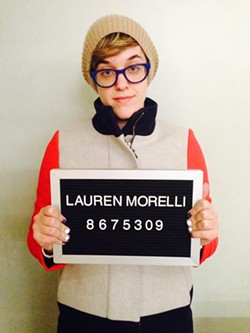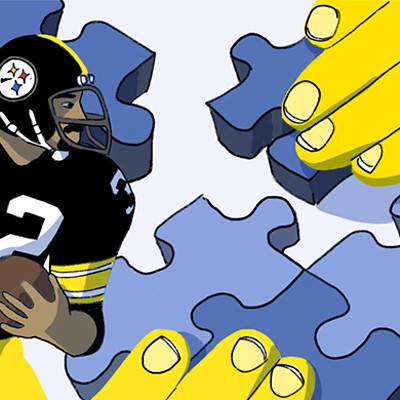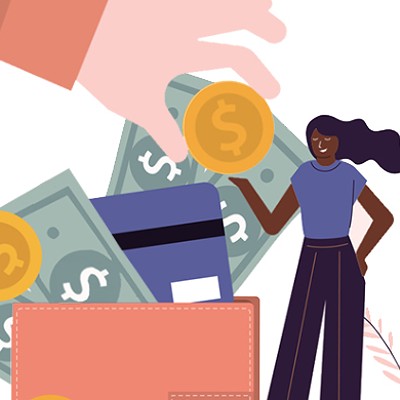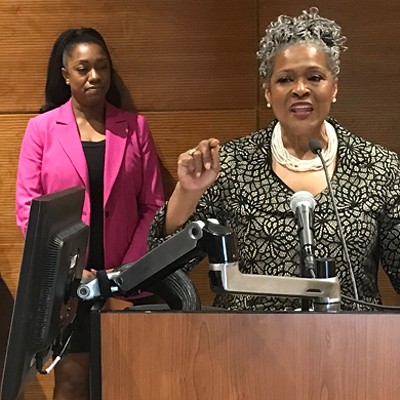Friday, March 6, 2015
Q&A with "Orange is The New Black" writer Lauren Morelli, in Pittsburgh March 10 for LGBT fundraiser
Lauren Morelli's path to becoming a writer and co-producer on the Netflix hit series Orange is the New Black was hardly linear. The McCandless native didn't start seriously writing fiction until after college — and spent years working as a personal assistant, nervously wondering what her next move would be before landing a gig on Orange. She's in town as the keynote speaker for the Women and Girls Foundation "Crossroads" conference next Tuesday, March 10 and will attend a "Night Out With Orange" benefit for Project Silk and the Delta Foundation that evening, 8 p.m. at Cruze Bar. Tickets for that event are available here. In advance of her appearance, Morelli spoke with City Paper about everything from why she got into TV to how working on the show made her start to question her sexual identity and leave her husband.
What drew you to writing and how did you make your way to Orange is the New Black?
It was a very long meandering process. [laughs] I was a dance major in college. I'd lived in New York and then moved to LA and been there for about 8 years. I knew I wasn't going to dance but I didn't know what was next, [so] I started taking various assistant jobs. It was just so far from everything that I had imagined my life was going to be. I started writing just for myself — short stories and scripts. That eventually lead to getting a manager and an agent. Orange is my first professional writing job — Jenji Kohan who’s our showrunner and creator, is really one of the only showrunners I know who will hire someone who doesn't have any experience — she really responded to my script. When I met her I think we both felt like we were really kindred spirits.
What's important about Kohan's philosophy?
I think a lot of showrunners care about someone coming in and having a similar voice or being able to mimic their tone, which certainly is important when you’re writing on a show. But Jenji really wants to know that you have your own point-of-view and that you’re going to come in be an individual. I always call our writers room the land of misfit toys. We’re all very unafraid to stand up for our opinions.
I was recently chatting with a TV writer who expressed some concern that new mediums (like Netflix) are creating more fractured and specialized audiences, that we aren't all watching the same shows. What kind of audience do you have in mind when you’re writing an episode?
I actually don’t think about the audience. I think part of what’s made [Orange] so successful is we had no real concept of who the audience was going to be. Netflix was brand new in the original programming space — they hadn’t released House of Cards yet. So it felt like being in the wild west. We weren't writing a network show where we were beholden to advertisers, so it felt very much like we could do whatever we wanted. And I think because of that, I never could have anticipated the audience for Orange would be as broad as it is. I thought it was going to be a very specific group of women who would love it. I kept joking there would be like 10 lesbians in Wisconsin who are going to be really into the show [laughs]. Now that it’s successful, I think it’s really important to not consider the audience. Because when you start writing to the audience, that’s when it can get a little pedantic or expected. Even as an audience member, as someone who watches a lot of TV, I can feel when I’m being pandered to.
Lots of representations of the LGBT world on TV right now are overwhelmingly upper/middle class and white. That’s certainly true of Piper [the lead character in Orange], but the show also includes black women, gay black women, trans women. Are there conversations in the writer’s room about how to responsibly or authentically represent those voices?
I think having a range of people and having it authentically represent our population as a country — but then also the population that would be in a women’s federal prison — that’s really important to us. We were given this real opportunity because, of course, there’s this stereotype of ‘gay for the stay.' But talking about those stereotypes [...] got us to this really interesting place: There are women who are gay inside and outside of prison, there are women who are just gay for the stay — what does that mean about female sexuality? When we were creating the show, it was a lot of just sitting around in a room and talking about sexuality and our conceptions of it and how we wanted to talk about it on the show.
How do you know when you’re hitting your mark in terms of what living in a women’s prison might actually be like?
Piper Kerman, who wrote the memoir and serves as a consultant on the show, reads every script that we write. You’re trying to create really exciting stories, but sometimes we go a little too far. She’ll get a script and be like ‘OK, guys, no one's walking around outside at night.' And we also have federal prison consultants; we’re pretty fastidious in that process. And we also went to visit a minimal security federal women’s prison in California which was really really helpful in shaping the world.
Was there anything about that trip that opened your eyes or offered some insight in your writing about prison?
Oh my gosh, so much. It [took] months and months to get approval for us to go. So when we went, I assumed we would be given the Disneyland tour of prison. It wasn't that at all. We not only were given a lot of access, but we also were able to talk to the inmates, which was really amazing, and I remember very clearly having a conversation with a girl who was my age, maybe younger. [She was] this adorable, blond, tiny woman and she looked like someone that I would be friends with. Talking with her was just like 'you made a left turn when I made a right turn, and that’s the only thing that separates us.'
You wrote an essay about how the show was a vehicle for you coming out. What was it about that context that made you think "holy shit, am I gay?"
[Laughs] Yeah, it certainly was the perfect breeding ground for that. The first couple months of being in the writer’s room in the first season—I was sitting in a room with very intelligent, creative people. And we were having every conversation you could ever have — the most intimate vulnerable conversations about sexuality. You do so much of that in a writer's room: mining your own stuff for the sake of the show. It was a safe place to begin to be able to ask myself those questions. But also while we were having those conversations, even in a joking way, a lot of stuff started to be mirrored back at me like ‘uh, I think you’re way gayer than you think you are.’
There’s this line in your essay where you’re talking about all the people who are skeptical about you having the realization that you're gay at that point in your life.
I definitely very clearly identify as gay even though it took me a long time to get there. The number one assumption I think that most people make when someone comes out a little later in life than what we might socially accept is like, ‘oh well you must have known.’ I think the thing I've learned most is however anyone reacts is more about them than it is about me.
Why did it feel important to you to tell your coming out story publicly?
It was a really scary thing to do and certainly I came out to a fair amount of resistance [from] people who were close to me because it had been so painful for myself and everyone involved. So there was this feeling of like, why open that wound up publicly? I felt like I had a platform with the show and I also knew that the thing that had made it hardest for me to come out was that I didn't know any other women my age who had come out. I knew plenty of gay friends who came out in high school or college — I knew women that were even a little older than me. I just couldn't find anyone who had my story and that often made me feel like I was crazy. It made me feel like I was wrong. I thought if I could do this difficult thing and put something on the internet, where the next girl can Google me and find this, that’s something I couldn't walk away from.
You also started dating Samira Wiley, who plays Poussey on the show—what’s it like maintaining that relationship while simultaneously writing for her character?
I think we try to keep those two things separate as much as possible. The work is the work and our relationship — we’ve learned the value of privacy. We guard that pretty safely. On the other hand, the writers and cast and crew, we’re very much a family. Everyone there has been so supportive of us. It felt like a pretty seamless transition.
So there’s no inside lobbying for a particular subplot?
The opposite — I think I've actually kind of dropped out of that. I try to let other people spearhead her character and her story lines.
Anything you always do when you’re back in Pittsburgh?
If it were warmer, I would be going to the Pittsburgh Zoo. It’s one of my favorite places. But it’s funny, I’ve been gone long enough now that I feel like my old haunts — I always go to Pamela's and I always go to Prantl's for a cookie — but my closest friends from high school are still here so I sort of lean on them for like the 20 new amazing restaurants that have opened in the last year. I’m endlessly amazed at how much it’s changing now.
Do you have any advice for young screenwriters/playwrights who feel daunted by the prospect of breaking into a fulfilling writing gig?
I signed with an agent and when I signed with them I thought ‘oh, it’s going to be a matter of days before I’m a professional writer.’ And then a year and a half went by and nothing was happening. I wasn't getting a lot of meetings. And so toward the end of that year-and-a-half, I’d written this script and I’d written it from a place of ‘I’m just going to write a thing I love and I know it’s going to be the least sellable thing.' It wasn't for a network it wasn't for any intention other than just writing something that felt really good to me. And that script is what got me hired on Orange. That’s always the advice I give: You just have to lean into what you love and what you think your voice is.
What was that script about?
Oh god [laughs]. I can’t even distill it down. What I can tell you is it includes something my agent often refers to as ‘the break dance,’ which might be the reason I didn't get any meetings.
I’m curious what you think your voice brings to Orange?
I always joke that I’m the Parenthood writer in the room. I’m such a sucker for moments of really authentic emotion. I think my scripts tend to be a little more emotional and dramatic than another writer whose scripts are always hilarious. I’m always pushing for ‘let’s make them cry.'
Season three is scheduled to drop June 12. What should we expect?
Season two was really dark and I think we really were excited about playing with this antagonist of Vee and seeing what that force would do to the characters we started to love over a season. I think season three is sort of a natural rebound from that darkness. Some of the joy comes back to Litchfield that was lost.
Are you working on projects outside of Orange?
I’m developing right now a show that I can’t really talk about, but yes, I have my own stuff going. But I’ll also, hopefully, when Orange comes back for a season four, continue with that.
Editor's note: This Q&A was edited for length and clarity.
Tags: Orange is the New Black , Lauren Morelli , Women and Girls Foundation , Jenji Kohan , Image














